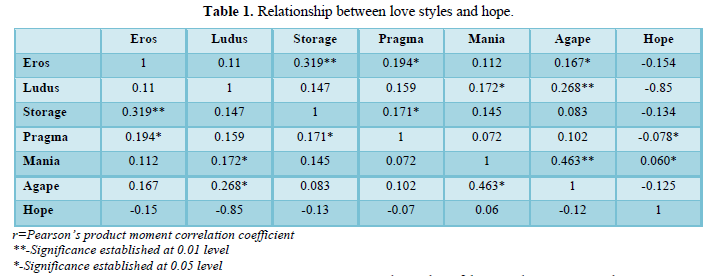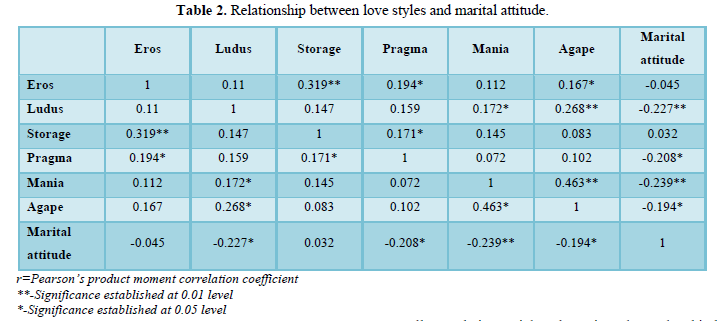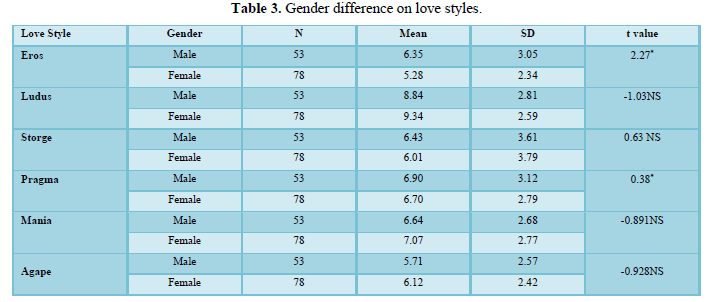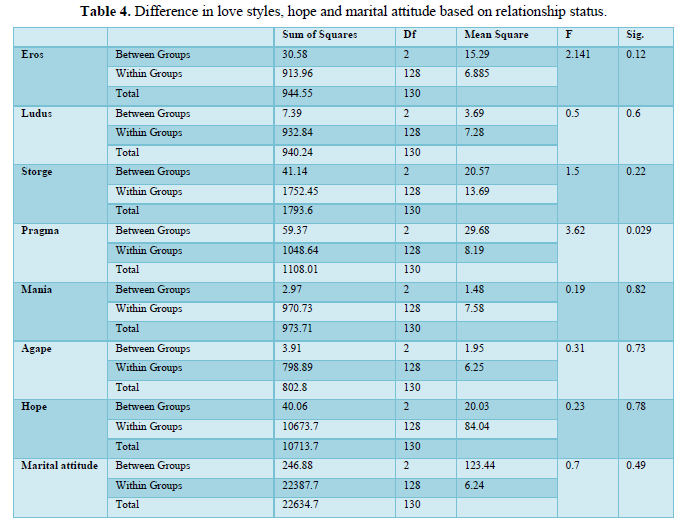Review Article
The Effect of Love Styles on Hope and Marital Attitudes Among Young Adults
6285
Views & Citations5285
Likes & Shares
Love style affects an individual’s relationship with his or her partner. Understanding the love style of the partner would help the individual to be aware of an individual’s style of love. The independent variable is love styles and dependent variables are hope and marital attitudes. The study used a correlation design and Love Attitudes Scale: short form by Hendrick, Adult Hope Scale (AHS) by Snyder and Marriage Attitude Scale by Pramod Kumar were used. The sample size was 131 which included males and females from Chennai who are married, in a romantic relationship and who are not in any romantic relationship. The study used convenience sampling technique. The researcher analyzed the strength of the relationship among the variables. The findings suggested that ludus and storge were the style of love that had an inverse relationship with marital attitudes and Agape, a style of love affected both hope and marital attitude of the participants. It was also found that there were no gender differences.
Keywords: Love styles, Hope, Marital attitude
INTRODUCTION
Love has the potential to enhance the life of an individual. Love style affects an individual’s relationship. The theory of six love styles was developed by John A. Lee in the year 1973. According to this theory, different individuals approach love relationships in different ways. Lee identified three primary love styles, namely, Eros (passionate love), Ludus (game-playing love), Storge (friendship love), and three main secondary styles: Mania (possessive, dependent love), Pragma (practical love), and Agape (altruistic, selfless love). These secondary styles were conceived as combinations of primary styles. Mania is a combination of Eros and Ludus; Pragma is a combination of Storge and Ludus and Agape is a combination of Eros and Storge. All these styles of love are valid. Understanding the partner’s style of love would help in building a healthy love or marital relationship since Marriage is the union of two individuals who make permanent commitment to each other, One of the important factors in achieving marital satisfaction is love; love is the most important factor in choosing the spouse because despite its romantic and sexual aspects, it includes individuals' talent for accepting commitment to others. Marital relationship has positive and negative aspects like other relationships in life. Individuals vary in their attitude towards marriage. These attitudes influence their romantic relationship. When an individual has a positive attitude towards marriage, his or her way of handling tough life situations tend to be positive and also the way they deal with problems with their partners is also positive. This might lead to a healthy relationship. On the other hand, if the individual has a negative attitude towards marriage, the possibility of him or her dealing with small daily life difficulties might be on the contrary. In our Indian culture, though the trend on being in a relationship without getting married is on a raise among young adults, older people still believe in marriage and look at it as a necessity. Therefore, those individuals who have negative attitude towards marriage, but are forced to get married, might not handle their relationship in a good way. Understanding the attitude towards marriage and the influence of love styles on their attitude will help the individuals to deal with their relationship in a better way [1].
Hope is also an important factor in any relationship. Halevy defines hope as, a future-oriented, positive emotion that often emerges in challenging and difficult circumstances. It motivates an individual to deal with the obstacles in life using strategies that increases their chances of success. The possibility of finding love or life partner is high for individuals who are in their 20 to 30 years of age.
Being aware of the styles of love and their relationship with marital attitude and hope would help the young adults build a healthy romantic relationship [2].
The current study investigates the effect of love styles on hope and marital attitude as individuals express their love in different ways it is important to focus on an individual’s love style and the love style of their partner. To do this, the individual should become aware of their and their partner’s style of love, which will result in mindful actions in the romantic relationship. When partners meet each other’s needs, there will be feelings of positivity, understanding and security. If either of the partners does not feel understood, it may result in unhappiness. The goals of Magdalena Marzec Andrzej Łukasik, was to know whether love styles of an individual may be treated as sexual/reproductive strategy or not in the context of Life History Theory i.e., slow or fast strategy among the 177 people and found that people who preferred the slow reproductive strategy are inclined to passionate, pragmatic and friendly love, and those who preferred the fast strategy, treated love as a game. A low level of environmental stress in childhood results in preferring eros, storage and agape love styles, belonging to the slow strategy, and a high stress results in preferring ludus, which belongs to the fast strategy. People representing eros, storage or pragma styles have restricted socio-sexual orientation, so they prefer long-term relationships, whereas those with the ludus style are people with unrestricted orientation, preferring short-term relationships. Besides, storage, agape and pragma seem to determine preferring qualities connected with parental effort in one’s partner, mania is associated with mating effort, and eros is related with both kinds of effort. The study was done to identify the relationship between the attachment styles and obsessive love style Bahareh Honari Ali Akbar Saremi [3]. The samples included 306 graduate students who took up Adult Attachment Style (AAQ) and Love Attitude Style (LAS) Questionnaires. It was found that the Ambivalent Insecure Attachment Style has a role in producing Obsessive Love Style. Significant relationship among Obsessive Love Style and Attachment Styles was found. Attitude towards marriage and family relations among Indian youth was studied by Singh with 140 males and 100 females as respondents. 12 items from social change attitude scale was used to know their attitudes. The findings of the study showed an optimistic change in the attitudes. A positive attitude towards the female child and importance of parents’ consent in marriage was highlighted. Sexual satisfaction was seen as primary aim of marriage predominantly by males than females.
Higher hope has correlated positively with social competence by Barnum, Snyder, Rapoff, Mani, and Thompson, pleasure in getting to know others, enjoyment in frequent interpersonal interactions by Snyder, Hoza, and interest in the goal pursuits of others Snyder, Cheavens & Sympson. When hopeful thinking is stymied, interpersonal struggles may result. For instance, ruminations block adaptive goal-related thinking, and cause increased frustration and aggression against others by Collins and Bell, Snyder, Snyder and Feldman. Also, the interpersonal problems of others can translate into lowered hope for children. On this point, children who have witnessed family members or friends who have been victims of interpersonal violence have lower levels of hope than children who have not seen such violence by Hinton-Nelson, Roberts, and Snyder [4].
Operational definition
Love is defined as an expression of trust, commitment and respect by Lee 1973
Love styles: John Lee had identified six love styles.
- Eros: It is romantic, passionate love. There is a strong physical and/or emotional attraction.
- Ludus: It refers to playful love where there is no commitment. Ludus is all about passion and having fun with each other doing different activities, but one does not desire commitment.
- Pragma: It refers to practical love. This can involve looking for a partner with whom one share similar interests and goals. It encompasses a practical and mutually beneficial relationship.
- Storge: It refers to a friendship-based love, where the person slowly develops a need for attachment. While it lacks passion, the person is slowly drawn to commitment.
- Mania: It refers to obsessive love where the person is jealous or obsessive. Manic lovers view their partners as possessions and feel that they need them. These feelings can result into doing things such as stalking or other behavior to try to reciprocate their obsessive love.
- Agape: It refers to altruistic, selfless love. Agapic lovers like to give more than to receive. They are forgiving, patient, faithful, and are willing to make sacrifices for their partner.
- Hope: Hope Snyder is defined as a positive motivational state that is based on an interactively derived sense of successful (a) agency (goal-directed energy) and (b) pathways (planning to meet goals). Pathway thoughts refer to the routes we take to achieve our desired goals and the individual’s perceived ability to produce these routes. Agency thoughts refer to the motivation we have to undertake the routes towards our goals.
PROBLEM STATEMENTS
- To know the love styles of males and females.
- To discover the level of hope among adults.
- To identify the marital attitude among adults.
Objectives
- Which style of love has high scores on hope?
- Does hope influence marital attitude?
- Which style of love will show more positive attitude towards marriage?
Hypothesis
- The styles of love such as Eros, Ludus, storage, Pragma, Mania, Agape are significantly related to Hope.
- The styles of love such as Eros, Ludus, storage, Pragma, Mania, Agape are significantly related to Marital attitude.
- Gender difference will have no effect on the styles of love.
- The type of relationship will not have an effect on the styles of love, hope and marital attitude.
Method of investigation
The aim of the study is to find the relationship between the variables, loves styles, hope and marital attitude of young adults using co-relational design to establish the relationship between the variables. Independent variable of the study is Love styles and the dependent variables are Hope and Marital attitude. Males and females in the age group 18-30 formed the sample for the current study and the size of the sample is 131 (53 males and 78 females). The samples comprise of people from college, participants who are employed or unemployed, also with people who are in homosexual sexual relationship. The study used probability sampling to recruit the participants. The study used simple random sampling technique. The tools used were Love attitude scale by Hendrick to identify attitudes toward love. The scale has 6 subscales, eros, ludus, storge, pragma, mania, agape. Participants were instructed to answer with their current partner in mind. However, if the participants have never been in love, they were asked to provide answers which they believe would be true [5]. The Adult hope scale by Snyder was used to identify the hope patterns of the samples which was given. The scale has two subscales that comprise Snyder’s cognitive model of hope: (1) Agency (i.e., goal-directed energy) and (2) Pathways (i.e., planning to accomplish goals). Marriage attitudes by Pramod Kumar was used.
RESULTS & DISCUSSIONS
The hypotheses were constructed to find the relationship between love styles, hope and marital attitude. It is observed in Table 1 that the hypothesis.
“The styles of love such as Eros, Ludus, Storge, Pragma, Mania, Agape are significantly related to Hope.” On regards to the r value of Pragma and Mania, the styles of love which is -0.078, 0.060 are significantly related to hope is accepted.
This shows that when hope levels are high in an individual it leads to an indirect expectation of reciprocation from the partner that rules out the unselfish nature of love found in agape style. This could have been the reason for the inverse relationship between agape style of love and hope [6].


The hypotheses were constructed to find the relationship between love styles and marital attitude. It is observed in Table 2 that the hypothesis.
“The styles of love such as Eros, Ludus, Storge, Pragma, Mania, Agape are significantly related to Marital attitude”. With regards to Ludus, Mania and Agape seem to have an inverse relationship with marital attitude based on the r value which are -0.227, -0.208, -0.194 is accepted. In case of Ludus love style it was an obvious expectation based on the existing theory that individual whose style of love is ludus will tend to be less serious about the partner and thinks less about living with the same partner for lifetime. When an individual possess mania as his/her love style there are possibilities that it might create an indirect fear which will rise a question in that individual about getting married and spending their lifetime with the partner. This fear might arise due to the obsessions an individual has in maniac love style. These obsessive behaviors will lead them to have rituals about their relationship in the form of relationship goals. When those goals are unmet it will act as an indirect threat that might affect their attitude towards marriage. In case of agape, it can be understood that since it is an unselfish form of love, an individual with agape love style might not expect for their partner to get into lifelong commitment with them which can have very vague notions about marriage and many doubts for them regarding marital life and roles which might hinder them to have an optimistic attitude towards marriage.


The hypothesis “gender difference will have no effect on the styles of love” is failed to accepted since a significant difference was found among the adults who have Agape love style with regards to the t value -0.928 which shows that the values fails to reject the hypothesis Females seem to have higher mean values than males with regards to Storge, ragma, mania and agape styles of love (Table 3). This is probably due to the insecurity’s women hold when compared to men in romantic relationship. The fact that men are more prone to have multiple partners and females are restricted in India could be a possible reason for the insecurities they face. These findings also show that women prefer storge, pragma, mania and agape styles of love than men. This shows that women tend to believe a good romantic relationship can start from a friendship this may be due to the compatibility that is predetermined between partners from friendship stage which bases their trust on the relationship more. Woman also tend to prefer pragmatic love style may be to avoid being taken as advantage to hurt and invest more equally with men in the aspects of emotionality experienced in the relationship. Women tend to fall under agape mania style of love may be because they find satisfaction in life by being unselfish in romantic relationship than men and also to be completely occupied about their relationship and about their partner from mentally to being might also give them the kind of happiness they want. Establishment and emphasis on equality in gender on marriage could have affected the results. Also, significant difference was found between males and females on hope and marital attitude this may be due to the breakthrough on gender bias on marriage.
The hypotheses were framed to find the differences in terms of variance of love styles based on the relationship status on three categories, single, unmarried but in romantic relationship, married respectively (Table 4). It is found that “The type of relationship will not effect on the styles of love” was not accepted on the basis of variance that was found to be [F (2,128) =3.62, p= 0.029] which is significant with regards to the pragmatic style of love. Hence there is a significance value that is found which leads the researchers to carry out post hoc analysis. The mean difference (1.45) was found which predicts pragma is the style of love leads to the romantic relationship and also acts a maintaining factor in sustaining relationship.
The difference in romantic partners in pragmatic style would have occurred may be the romantic relationship is rewarding for the person in terms of serving celebrity value and also basing the partner as a status symbol would gratify the individuals by having less emotional connect and reactions being invested in the relationship. Investing less and gaining more in relationship by both material and emotional aspect might reduce the fear of being hurt or dependency on partner could be a factor that leads to prefer pragmatic style of love.




SUMMARY AND CONCLUSION
The ludus love style is seen most predominantly among young adults may be because of heightened exposure to love and sexuality through media a decreased emotional experience that leads the youth to prefer gratification over satisfaction in relationship could have been the possible reason. Also, game playing may allow these individuals to keep others at an emotional distance to maintain their short-term mating style. Storge is the second most seen love style may be because of the belief of strength in relationship might occur when romantic partners are friend’s prior that would give more confidence in trusting a person on lifetime commitment. This can also be due to the fear of loss of a person after being invested emotionally. Storgic love can also be looked at an advantage lie partners does not need to sacrifice or compromise much in relationship or married life further hence the bond is already established along with the understanding of each person's needs, desire, goals in life. Agape and mania styles of love existed much in combinations. This may be due to the existing beliefs and understanding love that if an individual is obsessed to their partner so will they be unselfish in the romantic relationship. They might tend to discount the partners negative activities (sign of mania) and remain non expecting of any reciprocations (sign of agape) from the partner.
It was also found that people with ludus style of love seem to have more negative attitude towards marriage that that can be validated by the definition of ludus love style. Agape was found to affect the hope and marital attitude. this may be due to the self-centered lifestyle that people are comfortable with so when there is an expectation of reciprocation in relationship it makes it selfish.
Females were found to have pragma, agape and mania styles of love than males this may be due to the habits or rituals women believe on in terms of idealizing relationship goals and having high dependence on partners. Pragma was the love style seen mostly on individuals in romantic relationship due to the belief that expectations can be met, and an individual can sacrifice or compromise less.
OTHER FINDINGS
Inter correlations among the love styles were found, some of which was significant.
LIMITATIONS
- The samples included the age group from twenty to thirty; thus, the generalization of the results to other age groups is limited.
- The data being collected by the self-report method can involve some biases in the responses.
- The results not being based on longitudinal research, they can only be interpreted as co relational relationships, not as causal relationships.
IMPLICATION
The first major practical contribution of the present research is that it provides much needed empirical data to addresses the existing gap on the effect of different styles of love on hope and marital attitude. This study has several implications for therapists and researchers interested in how love styles might have an impact on marital attitude and hope. Another implication would be that, it helps the couple to be aware of how their love styles will impact their relationship. The therapist can help the individuals having issues in this area by developing more cognitive behavioral strategies and the awareness of love styles their attitude towards marriage can help the clients in pre-marital, marital and family counselling stages. The present research is especially timely because in India the rate of divorce due to misunderstandings is on a rise. So, understanding the love styles, attitude towards marriage and hope will help the individuals to work on strengthening their relationship with their spouse.
FUTURE DIRECTIONS
Further studies can focus on the impact of love styles on marital attitude and hope among adolescents and older adults. A longitudinal study can also benefit the findings. Also finding the relationship between the variables among homosexuals can benefit the trending knowledge hunt in the field of psychology.
- Goodboy AK, Myers SA, Members of Investigating Communication (2010) Relational Quality Indicators and Love Styles as Predictors of Negative Relational Maintenance Behaviors in Romantic Relationships. Comm Rep 23(2): 65-78.
- Goodboy AK, Horan SM, Booth-Butterfield M (2012) Intentional Jealousy-Evoking Behavior in Romantic Relationships as a Function of Received Partner Affection and Love Styles. Commun Q 60(3): 370-385.
- Merolla AJ (2014) The role of hope in conflict management and relational maintenance. Pers Relatsh 21(3): 365-386.
- Samp JA, Palevitz CE (2014) Managing Relational Transgressions as Revealed on Facebook: The Influence of Dependence Power on Verbal Versus Nonverbal Responses. J Nonverbal Behav 38(4): 477-493.
- Vedes A, Hilpert P, Nussbeck FW, Randall AK, Bodenmann G, et al. (2016) Love styles, coping, and relationship satisfaction: A dyadic approach. Pers Relatsh 23(1): 84-97.
- Yaffe P (2008) Can Learning Languages Help You Better Understand Science and Technology? Ubiquity 9: 26.
QUICK LINKS
- SUBMIT MANUSCRIPT
- RECOMMEND THE JOURNAL
-
SUBSCRIBE FOR ALERTS
RELATED JOURNALS
- Journal of Rheumatology Research (ISSN:2641-6999)
- Journal of Carcinogenesis and Mutagenesis Research (ISSN: 2643-0541)
- Journal of Otolaryngology and Neurotology Research(ISSN:2641-6956)
- Advance Research on Endocrinology and Metabolism (ISSN: 2689-8209)
- BioMed Research Journal (ISSN:2578-8892)
- Journal of Neurosurgery Imaging and Techniques (ISSN:2473-1943)
- Journal of Oral Health and Dentistry (ISSN: 2638-499X)






